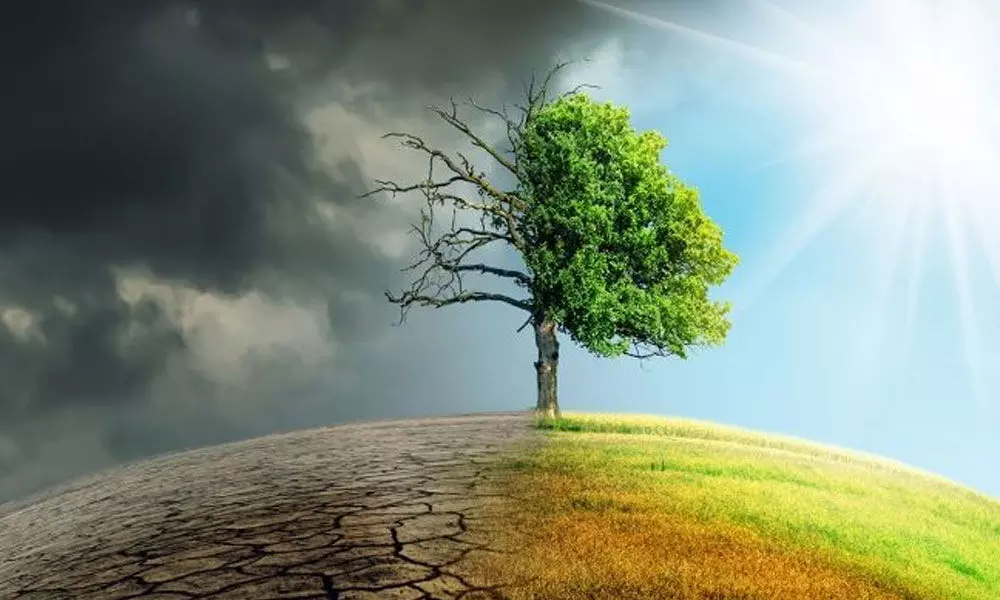Climate commitment India's new soft-power diplomacy mantra
PM calls for the ‘one sun, one world, one grid’ initiative to ensure solar power viability
image for illustrative purpose

Soft-power diplomacy has been the Mool Mantra of India's engagement with the global community since Independence. While in the past, it created international recognition through its doctors, engineers and entertainers. But, fast forward to the recent times - especially in the past decade, New Bharat has moulded itself into a new avatar of a space superpower that uses geospatial technology for the global good.
India has propagated the message of the 'Vasudhaiva Kutumbakam', a Sanskrit phrase that means 'the world is one family', and to walk the talk, India has developed and deployed space; rolled out vaccine diplomacy and contributed toward environmental discussion for a better world.
While China has used predatory positioning under the garb of providing infrastructure and development loans to nation-states, in contrast, India has successfully explored new ways to engage and contribute positively to the global population.
At the recently concluded COP26 or the climate change conference, India offered two new global initiatives, the World Solar Calculator and the Infrastructure for the Resilient Island States (IRIS), which will help advance its international patron image. Further, the Climate Summit held in Glasgow saw commitments from leaders of over 100 countries that have helped turn expectation into commitment.
The world solar calculator' app could prove to be a 'useful tool for nation-states while installing PV solar panels for tapping solar energy.' The app helps in identifying the ideal location for installing solar photovoltaic (PV) thermal power plants. Simply put, it is equivalent to the GPS that allows us to navigate to our destination. According to ISRO, "the app was developed by Space Applications Centre (SAC), ISRO, Ahmedabad at the behest of the Ministry of New and Renewable Energy."
At the climate summit, Prime Minister Narendra Modi and his British counterpart Boris Johnson launched the Infrastructure for the Resilient Island States (IRIS) Initiative "to develop small island nations' infrastructure." IRIS is a part of the Coalition for Disaster Resilient Infrastructure (CDRI) "that focuses on building capacity, having pilot projects, especially in small island developing states."
At the launch event, PM Modi also announced that the Indian Space Research Organisation (ISRO) would "build a special data window for Small Island Developing States (SIDS) for timely information about cyclones and coral reef monitoring through satellite." Such an initiative will instil "a new hope, a new confidence and satisfaction of doing a little" for the most vulnerable island nations. Using geospatial technology as a diplomatic medium is nothing new for India. In May 2017, India had launched South Asia Satellite or GSAT-9, "termed India's technology largesse from the sky to the peoples of six SAARC nations of Afghanistan, Bangladesh, Bhutan, The Maldives, Nepal and Sri Lanka, along with India.
The then 'leaders of the six benefiting nations hailed the gesture as a new face of cooperation in space for the common good of the neighbourhood.' It was seen as the 'symbol of South Asian cooperation' led by India's geospatial expertise.
Before the second lockdown, induced due to the Wuhan virus, India used its vaccine diplomacy to gain international recognition. Under the Vaccine Maitri, 'a humanitarian initiative undertaken by the Indian government to provide Covid-19 vaccines to countries around the world,' India delivered over 60 million doses to 95 countries.
In 2017, ISRO scripted history by successfully launching a record 104 satellites on a single rocket from the spaceport in Sriharikota. A total of 96 satellites belonged to International customers. Such space cooperation has been an ongoing feature of Indian diplomacy.
Through its new climate action commitments, India made it clear about its commitment to addressing the climate crisis through aggressive goal setting and international cooperation where the crisis will be fixed together instead of as stand-alone exercises.
This COP26 summit is also seen as historic as over 103 countries, including 15 major emitters, including Brazil, Nigeria and Canada, agreed to the Global Methane Pledge. They also committed to turning 'ambition to immediate action.' Thus, the summit has already received praise as 'countries have made unprecedented commitments to protect forests, reduce methane emissions and accelerate green technology.'
India has taken steps to fulfil its commitments, and it is rolling out geospatial solutions to assist other nations in meeting their emission goals. At the summit, Prime Minister Narendra Modi announced that India intends to achieve '500 GW of its capacity through non-fossil fuels and 50 per cent of its energy requirement from renewables at COP26 by 2030.'
Thus, India has proposed a bolder initiative than 'what appeared initially'. While departing from Glasgow, PM Modi tweeted, "India has not only exceeded the Paris commitments but has now also set an ambitious agenda for the next 50 years."
Since ancient times, India has respected its belief that "the world is one family." In recent years New Bharat has employed technology to build bridges with the global community. However, the new addition to soft-power diplomacy is Climate Community; thus, PM Modi's call for the "one sun, one world, one grid" initiative will ensure solar power viability.
(The author is Major SM (retd), Founder of MyStartup TV)

